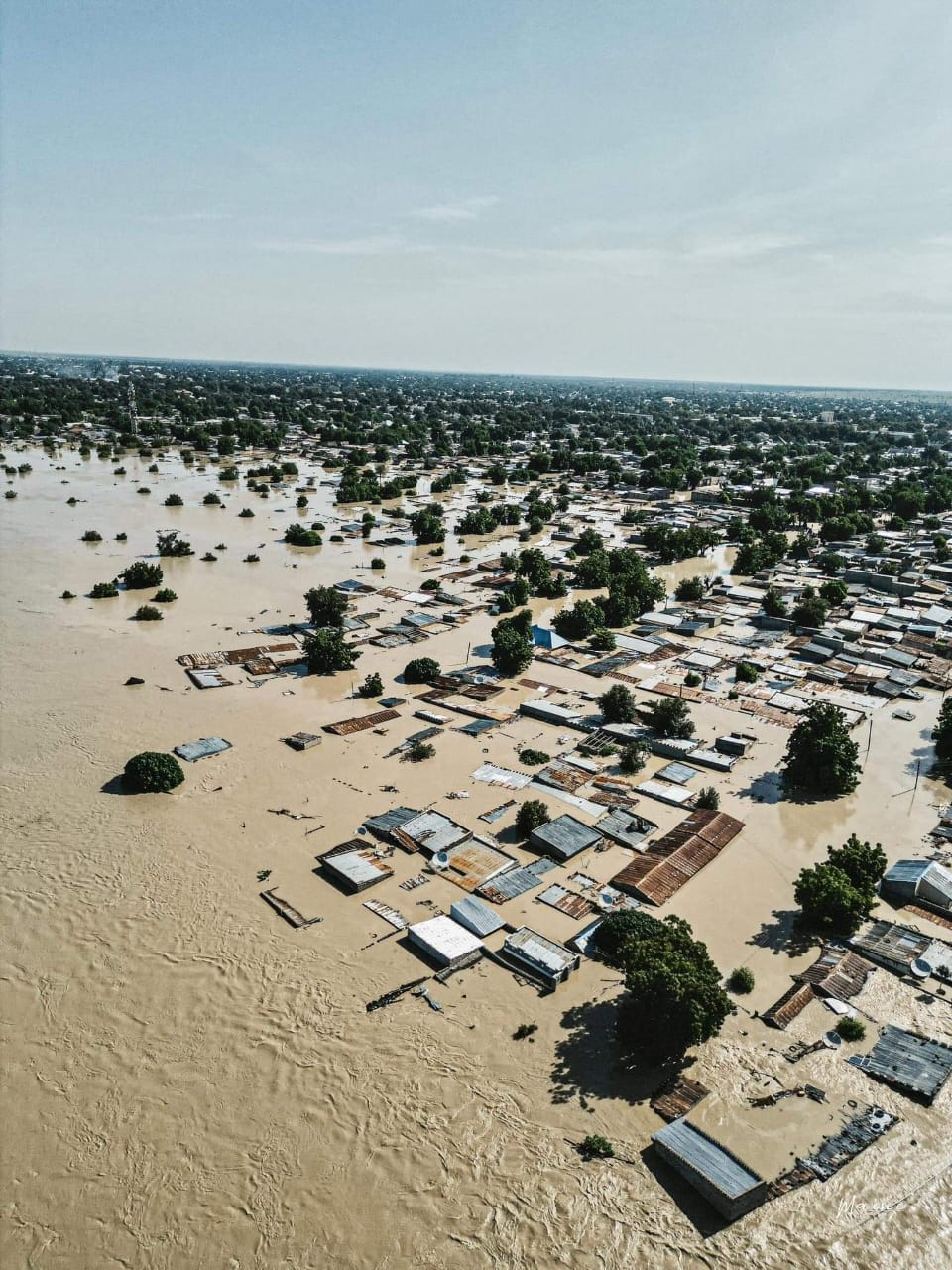Maiduguri needs our support
The unusual flood from Alau dam in Borno State, which travelled from about 10 kilometers and submerged most parts of Maiduguri metropolis in the early hours of Tuesday, September 10, 2024, was a catastrophe that should not have befallen any part of the country. The entire country is, thus, severely pained that it was suffered […]

Borno flood
The unusual flood from Alau dam in Borno State, which travelled from about 10 kilometers and submerged most parts of Maiduguri metropolis in the early hours of Tuesday, September 10, 2024, was a catastrophe that should not have befallen any part of the country. The entire country is, thus, severely pained that it was suffered by a Boko Haram-infiltrated community, which until recently, did not live normal human life for more than a decade.
From the interim report of the National Emergency Management Agency (NEMA) over 200,000 people were displaced, an unspecified number of people, including children are reportedly missing, and many properties including residential houses, farmlands, warehouses, business apartments and the popular Monday Market were submerged and destroyed. Other areas flooded include the Palace of the Shehu of Borno, Shehuri, Gwange, Adamkolo, Gamboru, Fori, Bulabulin, Post Office areas, Moromoro, and Customs Bridge. Retail shop owners had their commodities either swamped or washed away.
The Gwange Cemetery in Maiduguri was also washed away, leaving corpses floating in the streets. Many patients at the University of Maiduguri Teaching Hospital (UMTH) were also stranded as the facility was flooded. Patients were evacuated upstairs as the ground floor was affected. Relatives of patients were stranded as they waited in vain for ways to access the sick, who were complaining of hunger on hospital beds. Mothers were seen crying, looking for their little children.
The General Manager of Sanda Kyarimi Museum Park, Maiduguri, Ali Abacha, said 80 per cent of the wildlife in the zoo were killed by the flood. Abacha, in a statement, said deadly animals like crocodiles and snakes had been washed away into the communities. Worse still, the Nigeria Correctional Service (NCoS) has disclosed that 274 inmates got missing after flooding brought down the walls of the Medium Security Custodial Centre in Maiduguri; putting the whole country at risk.
With its level of devastation in which so far, NEMA said 30 lives have been lost and about one million, according to Governor Babagana Umara Zulum of Borno State, have been affected, the Maiduguri catastrophe is indeed a national emergency.
As a nation, the entire country empathises with the government and people of Borno State as they struggle to endure the psychological trauma, physical exhaustion, and the socio-economic losses and inconveniences suffered from the midnight flood.
We commend the military and youth organisations for their timely interventions in the rescue of victims. The reopening by the Borno State governor of IDP camps for victims of the flood is apt. Governor Zulum said a health emergency committee had been constituted to address potential outbreaks of flood-related diseases in Maiduguri and Jere. There should be a strategic public health initiative that could respond quickly to the outbreak of water-borne diseases, which may arise from the floating of exhumed corpses and the opening up of sewages, septic tanks and refuse dumps.
In addition to interventions received from the federal government, individuals and corporate organisations, including Alhaji Aminu Dantata, we call on well-meaning Nigerians to offer more interventions because Maiduguri has, for long, been on its knees. We urge the government of Borno State to prudently coordinate the receipt and distribution of all the relief interventions.
More attention should be paid to rescuing lives of those still trapped in their houses while measures should be taken to provide shelter, food and medicine to those living in IDP camps.
In view of the enormity of the incident, we welcome the assurance from the United Nations (UN) Resident and Humanitarian Coordinator for Nigeria, Mohamed Fall, for assistance, and call on international organisations and other countries to assist in the rehabilitation effort.
This tragedy should never have occurred if the Alau Dam had not suffered long years of neglect. This is even as the federal government claimed to have appropriated and spent N400 million on the dam in four years; with no tangible evidence of critical structural repairs to show for the expenditure.
We, therefore, call for an investigation into this lapse, and demand that those found to have failed in carrying out their assigned duties are brought to book.
Daily Trust also calls on other states to learn a lesson from the catastrophe that befell Maiduguri by carrying out due diligence on dams within their states.
With the red alert issued to 11 states by the federal government on the release of water from the Lagdo Dam in Cameroon, authorities concerned should be out to ensure that another catastrophe does not happen anywhere in the country.
